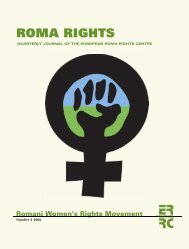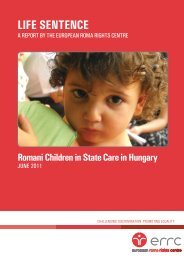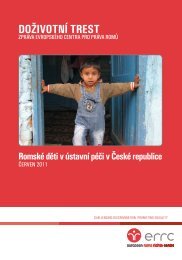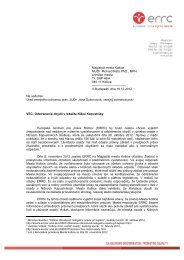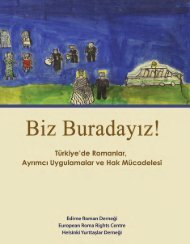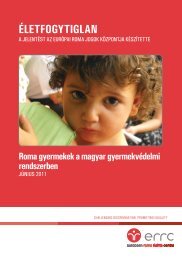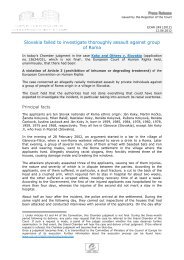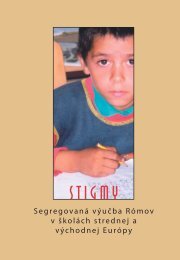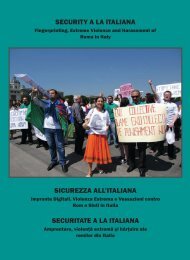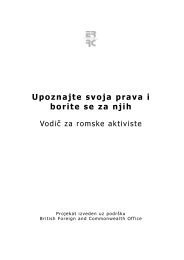TAKEN FROM THE CITY - European Roma Rights Centre
TAKEN FROM THE CITY - European Roma Rights Centre
TAKEN FROM THE CITY - European Roma Rights Centre
Create successful ePaper yourself
Turn your PDF publications into a flip-book with our unique Google optimized e-Paper software.
taken from the city<br />
A RepoRt by the euRopeAn RomA <strong>Rights</strong> CentRe<br />
romanian roma evicted to a rubbish Dump<br />
DeCembeR 2012<br />
ChAllenging DisCRiminAtion pRomoting equAlity
Copyright: © european <strong>Roma</strong> <strong>Rights</strong> <strong>Centre</strong>, December 2012<br />
All rights reserved<br />
Design: anikó Székffy<br />
layout: Dzavit Berisha<br />
Cover photo: © mirela chiorean<br />
the internet links contained in this report were active at the time of publication<br />
this report is published in english and <strong>Roma</strong>nian<br />
please contact the eRRC for information on our permissions policy<br />
address: 1074 budapest, madách tér 4, hungary<br />
office tel: +36 1 413 2200<br />
office fax: +36 1 413 2201<br />
e-mail: office@errc.org<br />
www.errc.org<br />
Support the errc<br />
the european <strong>Roma</strong> <strong>Rights</strong> <strong>Centre</strong> is dependent upon the generosity of individual<br />
donors for its continued existence. please join in enabling its future with a<br />
contribution. gifts of all sizes are welcome and can be made via pAypAl on the<br />
eRRC website (www.errc.org, click on the Donate button at the top right of the<br />
home page) or bank transfer to the eRRC account:<br />
bank name: BuDapeSt Bank<br />
bank address: Báthori utca 1, 1054 BuDapeSt, hungary<br />
bank account holder: european roma rightS centre<br />
euR bank account number: 30p00-402686<br />
(euR ibAn: hu21-10103173-40268600-00000998)<br />
sWiFt (or biC) code: BuDahuhB
table of contents<br />
1 Introduction 5<br />
2 The Eviction 7<br />
3 Measuring the Impact of the Eviction 9<br />
3.1 Discrimination, exclusion, and loss of security 9<br />
3.2 Housing conditions 10<br />
3.3 Education 12<br />
3.4 Health 13<br />
3.5 Employment and economic well-being 14<br />
4 Conclusions 15<br />
5 Recommendations 17<br />
report 3
1 introduction<br />
taken from the city<br />
“There is a constant unpleasant smell in the atmosphere, and the air becomes unbreathable when the<br />
garbage is being burnt in the pit next to us. Both smoke and smell intoxicate us. We can’t keep our<br />
windows open, to aerate the house. We must dry our clothes inside the house, because, if left outside,<br />
the smell infiltrates in them.”<br />
We don’t even feel safe here. There are packs of dogs everywhere, in huge numbers. We have to accompany<br />
our wives and children when they go to the bus, in order to protect them from the animals.<br />
Once the evening comes, most of the people retreat in their house, and very few dare to go out.<br />
Interview with a 62-year-old <strong>Roma</strong>ni man, Pata-Rât, November 2012<br />
On 17 December 2010 56 <strong>Roma</strong>ni families including some 270 people and at least 106 minors<br />
were evicted from Coastei Street in the centre of Cluj-Napoca in north-western <strong>Roma</strong>nia.<br />
The families were given just one day’s notice of the eviction. They had been living in Coastei<br />
Street for over 20 years. The families were taken to Pata-Rât, a polluted industrial area which<br />
is also the location of the city’s rubbish dump. Municipal authorities provided accommodation<br />
for 40 families in 18 metres squared substandard modular shelters. The remaining 16<br />
families were given no accommodation and had to stay with families who had received accommodation,<br />
greatly increasing overcrowding.<br />
The National Council for Combating Discrimination held that the eviction, relocation and<br />
isolation of the families in Pata-Rât amounted to ethnic discrimination, and the municipality<br />
was fined approximately 2000 EUR. 1 To date, there has been no resolution to the situation<br />
in which the evicted families find themselves, no provision of adequate alternative accommodation<br />
for them, and no compensation for property which was lost in the eviction and<br />
subsequent destruction of houses.<br />
The <strong>European</strong> <strong>Roma</strong> <strong>Rights</strong> <strong>Centre</strong> (ERRC) is supporting people now living in Pata-Rât in<br />
a number of domestic legal proceedings including administrative proceedings against the<br />
municipality. On behalf of the evicted families, the ERRC is seeking damages and relocation,<br />
and has also instigated proceedings requesting public information and documents relating to<br />
the eviction and the building of modular housing.<br />
The ERRC has also supported the community in establishing an NGO, The <strong>Roma</strong> Community<br />
Association from Coastei, through which the individuals concerned can have a stronger voice in<br />
advocating for their own rights.<br />
1 Consiliul National Pentru Combaterea Discrimiarii (NCCD), Comunicat de presa referitor la decizile Colegiului director<br />
al CNCD din data de 15.11.2011, available at: http://www.cncd.org.ro/presa/Comunicate-de-presa/<br />
Comunicat-de-presa-referitor-la-deciziile-Colegiului-director-al-CNCD-din-data-de-15-11-2011-124/.<br />
report 5
introDuction<br />
6<br />
This briefing measures the impact of the Coastei Street eviction on the families involved two<br />
years after it was conducted. It is based on interviews carried out by the ERRC in November<br />
2012 with 199 of the <strong>Roma</strong> who were evicted and relocated to Pata-Rât, where they are living<br />
in 40 modular homes and 14 improvised homes.<br />
key findings<br />
Housing conditions:<br />
● The average living space is 4.01 metres squared. Each available bathroom is shared<br />
between at least 17 people.<br />
● 92% of residents report the presence of mould in their accommodation.<br />
● 89% of residents report that they do not have adequate cooking facilities.<br />
● There is no water connection in any of the modular homes, and no hot water. Heating<br />
is provided only through wood-burning stoves, and 11 homes are without electricity.<br />
Employment and economic well-being:<br />
● Average income has fallen by 30%, while all individuals face extra living and transport<br />
expenses in their new location.<br />
● 28% of working age adults who were working before the eviction are now out of work.<br />
● The overall unemployment rate among adults in the community has increased by over<br />
20% since the eviction and is now 49%.<br />
Education:<br />
● 25% of children report being subjected to racist remarks at school, an increase from<br />
5.7% before the eviction.<br />
● 14 children (19.4 %) were refused admission to their school after the eviction and had<br />
to enrol in anther school.<br />
● 10% of children have been placed in special education for pupils with mild mental<br />
disabilities since the eviction, even though they were not previously in those classes.<br />
Health:<br />
● 30% of residents report some physical illness since the eviction, an increase of 14%.<br />
● When asked to self-assess their health 17% of individuals reported a drop in their<br />
level of health.<br />
● The average waiting time for an ambulance is estimated at about 92 minutes. It was<br />
11.5 minutes before the eviction.<br />
● On several occasions ambulances refused to respond to calls and on others residents<br />
had to wait between 2.5 and 3 hours for an ambulance to arrive.<br />
european roma rightS centre | www.errc.org
2 the eviction<br />
taken from the city<br />
On 15 December 2010 representatives of the Cluj-Napoca municipal authority informed the<br />
residents of Coastei Street that they had to submit a request for social housing for homeless<br />
people by noon of the following day. The next day the residents were instructed to pack all of<br />
their belongings. On 17 December several hundred local authority staff and law enforcement<br />
officers with bulldozers and trucks evicted the 56 families: 40 families were living in public<br />
housing rented from the City Council while the others were living in informal housing. Their<br />
homes were immediately demolished. The authorities did not provide legal authorisation for the<br />
eviction. The eviction was carried out in temperatures that reached minus 10 degrees Celsius,<br />
and in contravention of a prohibition on evictions during winter months in <strong>Roma</strong>nia. 2 During<br />
the demolitions, furniture, flooring, windows and personal possessions of the residents were destroyed.<br />
The land on Coastei Street was given to the <strong>Roma</strong>nian Orthodox Church shortly before<br />
elections; because of this, the eviction is seen by some observers as a politically calculated move.<br />
They evicted us in the middle of the winter. I was in the cold for seven hours with my three-week-old daughter.<br />
We were told that we would have firewood in the new houses. When we arrived we found dampness, cold<br />
air, and nothing else. The firewood was brought three months later when it was almost spring.<br />
Interview with a 25-year-old <strong>Roma</strong>ni woman, Pata-Rât, November 2011<br />
Upon arrival at Pata-Rât, municipal authorities compelled 40 families to sign lease agreements<br />
for alternative accommodation without having an opportunity to read the agreements or to<br />
view the accommodation being provided.<br />
<strong>Roma</strong> were forcibly evicted and relocated to Pata-Rât, where they live completely segregated<br />
from the rest of the city.<br />
PHoto CREDit: MiREla CHioREan<br />
2 <strong>Roma</strong>nia, Civil Procedure Code, Article 578, index 1.<br />
report 7
the eviction<br />
8<br />
protectionS againSt forceD evictionS in romania<br />
Article 11 of the Constitution of <strong>Roma</strong>nia states that <strong>Roma</strong>nia pledges to fulfill its obligations<br />
as deriving from treaties it is party to, and further states that treaties ratified by<br />
Parliament are part of national law. <strong>Roma</strong>nia is a State Party to the International Covenant<br />
on Economic, Social and Cultural <strong>Rights</strong> (ICESCR), which recognises at Article<br />
11(1) “the right of everyone to an adequate standard of living for himself and his family,<br />
including adequate food, clothing and housing, and to the continuous improvement of<br />
living conditions. […]. The UN Committee on Economic, Social and Cultural <strong>Rights</strong><br />
which oversees the ICESCR’s implementation has found forced evictions to be prima<br />
facie incompatible with the Convention. It defined in its General Comment 7 appropriate<br />
protections against forced evictions as including:<br />
● an opportunity for genuine consultation between those affected and state officials;<br />
● adequate and reasonable notice for all affected persons prior to the scheduled date<br />
of eviction;<br />
● information on the proposed evictions, and, where applicable, on the alternative<br />
purpose for which the land or housing is to be used, should be made available in reasonable<br />
time to all those affected; especially where groups of people are involved,<br />
● government officials or their representatives should be present during an eviction;<br />
● all persons carrying out the eviction should be properly identified;<br />
● evictions not to take place in particularly bad weather or at night unless the affected<br />
persons consent otherwise;<br />
● provision of legal remedies; and<br />
● provision of legal aid to persons who are in need of it to seek redress from the courts.<br />
Pata-Rât is the site of the municipal landfill and dump, located approximately seven kilometres<br />
from the city centre of Cluj-Napoca. It is the only waste disposal site for the city, and<br />
has been in operation since 1973. Although the site was supposed to be closed down some<br />
time ago, ERRC research indicates that it is still in use. An environmental assessment of the<br />
conditions around Pata-Rât showed that surface water contained large amounts of pollutants<br />
and categorised the environmental impact as “degraded environment, improper for life”. 3<br />
According to ERRC research, a pharmaceutical company based in Cluj-Napoca also dumps<br />
waste at the site. Although the dump has officially been closed due to failure to comply with<br />
EU waste management obligations, 4 it is still in use.<br />
The area around Pata-Rât rubbish dump was already home to a number of <strong>Roma</strong>ni communities<br />
and there are strong negative perceptions in Cluj-Napoca of the <strong>Roma</strong>ni communities<br />
living in that area, due mainly to the fact that they live on the site of the city rubbish dump.<br />
3 Gabriela-Emilia Popita, Contributions to the Efficiency of the Household Waste Management Systems (Case Study: Cluj<br />
county), Summary, available at: 193.231.20.119/doctorat/teza/fisier/373, .Section 6.1.3.5.<br />
4 See: http://www.errc.org/cms/upload/file/romania-pata-rat-17-january-2011.pdf.<br />
european roma rightS centre | www.errc.org
3 measuring the impact of the eviction<br />
taken from the city<br />
This ERRC survey was carried out with 199 residents of 50 homes in Pata-Rât: 35 families<br />
living in the substandard modular homes provided by municipal authorities and a further 15<br />
living in improvised housing at the same location. Those living in improvised homes were<br />
not provided with accommodation because they had not been registered officially on Coastei<br />
Street. These people have themselves built shelters in Pata-Rât.<br />
3.1 Discrimination, exclusion, and loss of security<br />
The eviction from Coastei Street and relocation to Pata-Rât has had an enormous negative<br />
impact on the lives of the people involved. From a long-standing and well-established community<br />
living close to public amenities, the evicted individuals have been moved to the edge<br />
of the city dump, far from the city centre.<br />
The stigma associated with living in this area has had a strong impact on the evicted<br />
people. While only 5.5% of residents reported that they had felt discriminated against<br />
before the eviction, 37.1% reported being discriminated against after the eviction. People<br />
who had not experienced discrimination previously reported feeling discriminated<br />
against in the fields of education, employment and health after the eviction because they<br />
were now living in Pata-Rât.<br />
A significant number of residents lack personal documents since the eviction: 50.7% of<br />
residents do not have a national ID for their new address and 20.1% of individuals report<br />
not having public health insurance for their new address. Residents report that they are<br />
reluctant to register for new documents at their address in Pata-Rât because of widespread<br />
discrimination against <strong>Roma</strong> from this location. One <strong>Roma</strong>ni woman reported completing<br />
all stages of an interview procedure with a cleaning company, only to be told that they<br />
would not hire her when she reported Pata-Rât as her address. Another <strong>Roma</strong>ni woman<br />
reported that once the staff of a medical clinic saw that she was living in Pata-Rât they<br />
removed the clean dressing from an examination table and replaced it with a sheet which<br />
was dirty and had already been used.<br />
All 199 residents of Pata-Rât who were surveyed reported that they do not feel safe for<br />
themselves or for their children in their new location, although they reported feeling safe<br />
when living on Coastei Street. The isolation of the site outside of the city and its location on<br />
the edge of a large municipal dump are both factors which explain this. There are also other<br />
security issues, such as a problem with large packs of aggressive stray dogs. Many residents<br />
report being bitten by stray dogs. The ERRC’s local monitor was confronted by a pack of<br />
approximately 30 wild dogs on one visit to Pata-Rât and had to seek assistance from residents.<br />
report 9
meaSuring the impact of the eviction<br />
10<br />
As well as being physically isolated, the area is also poorly served by public transport. The nearest<br />
bus stop is two and a half kilometres away and the nearest school is five kilometres away.<br />
Other amenities such as medical clinics, as well as most employment opportunities, are also<br />
located five kilometres or more from Pata-Rât. This causes difficulties for maintaining employment,<br />
attending schools, and accessing other services such as health care.<br />
<strong>Roma</strong>ni families who were evicted to Pata-Rât face discrimination and isolation in their new location.<br />
PHoto CREDit: MiREla CHioREan<br />
Even now in Pata-Rât the residents provided modular housing by the municipality lack security<br />
of tenure: their contracts for this accommodation expire in 2013 and they report that municipal<br />
authorities have told them unofficially that this housing may not be available after that time.<br />
Having already been evicted once from their homes in Coastei Street, residents fear that they<br />
may be evicted again and moved to an even more isolated location. The situation is particularly<br />
precarious for those living in improvised housing. These individuals report that the local authorities<br />
instructed them to build their own shelters in Pata-Rât, but they have no documentation<br />
or official permission for this accommodation which decreases even further the likelihood that<br />
they will be provided adequate alternative accommodation in case of another eviction.<br />
3.2 housing conditions<br />
The housing provided by municipal authorities after the eviction is modular accommodation,<br />
with a one room space of just 18 m 2 for one family in which they must live, eat, bathe and sleep.<br />
european roma rightS centre | www.errc.org
taken from the city<br />
Residents responded that their average living space dropped from approximately 6.33 square<br />
metres per person before the eviction to 4.01 square metres per person after the eviction.<br />
This is well below the standards set by <strong>Roma</strong>nian law for social housing. The average family size<br />
reported by respondents to the survey in Pata-Rât is 4.3 people. <strong>Roma</strong>nian housing law requires<br />
a minimum of 115 square metres for four people in social housing, with a useable area of 74<br />
square metres. In addition, each social housing unit should include a bathroom and separate living<br />
and sleeping quarters. 5 The housing units at Pata-Rât consist of four individual living spaces<br />
joined together which share one common bathroom, meaning that each available bathroom is<br />
shared by four families, with over 17 people. There is no water supply in the living area. Each<br />
block of four modular homes shares one water connection which provides only cold water.<br />
aDeQuate houSing StanDarDS<br />
General Comment No. 4 of the Committee on Economic, Social and Cultural <strong>Rights</strong><br />
sets out the meaning of adequate housing as guaranteed under Article 11(1) of the ICE-<br />
SCR. It includes seven aspects under which the adequacy of housing should be assessed.<br />
These are legal security of tenure; availability of services, materials, facilities and infrastructure;<br />
affordability; habitability; accessibility; location; and cultural adequacy.<br />
Some of the elements of General Comment No. 4 which are most relevant to the residents<br />
of Pata-Rât include the following:<br />
● All persons should possess a degree of security of tenure which guarantees legal<br />
protection against forced eviction, harassment and other threats;<br />
● All beneficiaries of the right to adequate housing should have sustainable access to<br />
natural and common resources, safe drinking water, energy for cooking, heating and<br />
lighting, sanitation and washing facilities, means of food storage, refuse disposal,<br />
site drainage and emergency services;<br />
● Adequate housing must be habitable, in terms of providing the inhabitants with adequate<br />
space and protecting them from cold, damp, heat, rain, wind or other threats<br />
to health, structural hazards, and disease vectors;<br />
● Adequate housing must be in a location which allows access to employment options,<br />
health-care services, schools, child-care centres and other social facilities; and<br />
● [H]ousing should not be built on polluted sites nor in immediate proximity to pollution<br />
sources that threaten the right to health of the inhabitants.<br />
Among survey respondents, 89% do not have any proper cooking facilities whereas 83% of<br />
households reported satisfactory cooking facilities when living in Coastei Street. Cooking is<br />
done on wooden stoves with improvised chimneys which the families had to install themselves.<br />
With no running water available directly in the accommodation, and no hot water<br />
supply at all, water must be drawn and heated for both cooking and cleaning. The stove is<br />
also the only source of heating in the accommodation. When one person wishes to bathe the<br />
others must wait outside the accommodation as there is no private space available for this.<br />
5 <strong>Roma</strong>nia, Housing Law 114/1996, Annex No. 1, available at: http://www.cdep.ro/legislatie/eng/vol49eng.pdf.<br />
report 11
meaSuring the impact of the eviction<br />
12<br />
Because food, hot water, etc. is prepared in such a confined space, the air inside the modular<br />
houses is warm and moist, creating perfect conditions for mould and dampness. The accommodation<br />
is poorly ventilated, and residents report that they cannot leave windows and doors<br />
open due to the strong smells emanating from the nearby dump, exacerbating these problems.<br />
Pata-Rât residents in all 35 modular homes and in 11 of the 15 improvised shelters included<br />
in the survey reported the presence of mould. In comparison, only four families reported the<br />
presence of mould in their homes on Coastei Street. The presence of mould is a main indicator<br />
of dampness, and the World Health Organisation recognises it as a threat to health. Exposure to<br />
mould and dampness in accommodation increases the risk of respiratory infections and asthma.<br />
Children and people of an advanced age are particularly at risk. 6<br />
In addition, 14 homes do not have a water supply, including seven modular homes; five<br />
homes remain without heating, including three modular homes; four homes do not have a<br />
connected electricity supply, including two modular homes.<br />
3.3 education<br />
School children have faced serious problems since they were evicted to Pata-Rât: 25% of<br />
children have reported racist remarks towards them at school since the eviction, while the<br />
number stood at only 5.7% before the eviction. Children are called “Gypsy from Pata-Rât”<br />
and “Gypsy from the dump” at school.<br />
Fourteen children (19.4% of those counted in the survey) were forced to change school<br />
since the eviction. Half of those who have had to change schools reported racist comments<br />
towards them. These children had been attending a school in Cluj-Napoca but were refused<br />
continued education in this school from their new address in Pata-Rât. According to the residents,<br />
parents of non-<strong>Roma</strong>ni children threatened to move their children when they heard<br />
that there were <strong>Roma</strong>ni children from Pata-Rât registered at the school. Faced with this threat<br />
the school director refused to allow the <strong>Roma</strong>ni children to continue their studies at the<br />
school. One respondent noted that their child who previously had no difficulties at school received<br />
a series of bad grades from one teacher and then a recommendation from that teacher<br />
that he should go to a special education class. His parents took him to a specialist, who<br />
confirmed their belief that he did not need to be enrolled in such a class. He then changed<br />
schools and his grades reportedly improved dramatically.<br />
Survey respondents reported that 10% of the school-aged children from Pata-Rât have been<br />
placed in special education for children with mild mental disabilities even though they had<br />
previously not been enrolled in those classes. The parents of these children report that they<br />
were enrolled in segregated education simply because they are living in Pata-Rât.<br />
6 World Health Organisation, Damp and Mould. Health Risks, Prevention and Remedial Actions, available at: http://<br />
www.euro.who.int/__data/assets/pdf_file/0003/78636/Damp_Mould_Brochure.pdf, 3.<br />
european roma rightS centre | www.errc.org
taken from the city<br />
In addition, eight children who previously had no problems at school reported having<br />
other difficulties since the eviction, while four children aged 14 and 15 had stopped going<br />
to school since the eviction.<br />
The schools attended by children in Pata-Rât are between five and eight kilometres from Pata-<br />
Rât. There is a school bus service, but it leaves only once per day at approximately 7.00 AM<br />
and returns only once at 2:00 PM. The children have different school hours depending on<br />
their age and the school they attend. Even if school starts at 10:00 AM, the only bus service<br />
available is the one leaving at 7:00 AM. Some children also miss afternoon classes because the<br />
bus returns to Pata-Rât at 2:00 PM pm.<br />
After-school activities have suffered greatly because of the distance and the time consumed<br />
simply with traveling to and from such activities. The majority of children have given up<br />
these activities. Sports, dancing, craftsmanship classes and charity work are all a thing of the<br />
past. The <strong>Roma</strong>ni children forcibly relocated to Pata-Rât no longer have access to a suitable<br />
environment for exercising their skills and socialising with other young people.<br />
3.4 health<br />
“After waiting three hours for the ambulance, they didn’t even want to come up to our house, and<br />
required me to go downhill, by foot, although I wasn’t physically able to do so.”<br />
Interview with a 28-year-old <strong>Roma</strong>ni women, Pata-Rât, November 2012<br />
The overall health of those evicted has worsened significantly in the two years since the eviction:<br />
30% of respondents report having a physical illness now, as compared to only 16% before the<br />
eviction. When asked to self-assess their health, 17% of respondents noted deterioration in their<br />
health since the eviction. Respondents have reported breathing problems and lung problems,<br />
which may be associated with the presence of mould in the housing. Six report discrimination<br />
in access to health services since the eviction, which they had not experienced previously.<br />
Overall many of the evicted people still have access to their family doctor or health service<br />
provider but the physical remoteness of their new location and lack of public transportation<br />
has made it more difficult to seek medical attention. As a result, the evicted families more often<br />
rely on emergency health services. Residents report that ambulances are reluctant to travel<br />
to Pata-Rât. On four occasions, including one when a mother called for medical assistance for<br />
her 3-year-old child, the ambulance refused to come. On several occasions people reported<br />
waiting for 2.5 to three hours for an ambulance to arrive. In another incident the ambulance<br />
came only after 2 hours and five phone calls requesting assistance.<br />
Residents also estimated the reaction time for a call to emergency services. On Coastei Street<br />
in the city the average time was estimated at about 11.5 minutes. In Pata-Rât the figure is 92<br />
report 13
meaSuring the impact of the eviction<br />
14<br />
minutes. This is not only a huge difference in waiting time, but it is clear that 92 minutes is an<br />
unacceptable waiting time and an inappropriate response in an emergency.<br />
3.5 employment and economic well-being<br />
“I honestly don’t even want to change my ID to the new address. My neighbours told me how drastically<br />
changes the attitude of an employer, or a doctor, once they see where you live. The employer never<br />
calls you back, and the doctor inserts offensive remarks, or simply pays less attention. The same goes<br />
for the police officers. Even during random checks, if they see Pata Rat written in your ID, they<br />
automatically become suspicious and quickly find something to fine you.”<br />
Interview with a 40-year-old <strong>Roma</strong>ni man, Pata-Rât, November 2012<br />
Families evicted to Pata-Rât report that their economic situation has been negatively affected<br />
by the eviction. Residents report that average income has fallen by 30% since the eviction. In<br />
addition, 90% of residents report having extra expenses related to the new place of residence,<br />
particularly in relation to transport to and from the city.<br />
The unemployment rate has increased from 29% before the eviction to 49% afterwards.<br />
Twenty working-age adults who were working before the eviction are now out of work. Finding<br />
work has become difficult because of the increased distance to work, destruction of social<br />
networks, and discrimination against Pata-Rât residents. Respondents have reported being<br />
refused employment directly because they were living in Pata-Rât.<br />
Among survey respondents, 50% of those who were in receipt of social allowances before the<br />
eviction are no longer in receipt of such benefits. Several respondents reported that because<br />
they do not have an ID card or other documents for their new address they have not been able<br />
to access social services. Respondents explained that the disadvantages associated with getting<br />
a new ID with their Pata-Rât address far outweigh the benefits of receiving social benefits: they<br />
reported that due to the discrimination they would experience if their ID showed their true address,<br />
they prefer to keep their old ID and manage without access to certain benefits.<br />
european roma rightS centre | www.errc.org
4 conclusions<br />
taken from the city<br />
The eviction of 2010 has had a significant negative impact on the residents of Coastei Street<br />
in all areas of life. Not only are the evicted people now living on the edge of the city rubbish<br />
dump, removed from their previous central location, but they face discrimination and other<br />
obstacles in access to a range of other human rights. The evicted residents have suffered economically,<br />
and their health status has worsened. Children face discrimination and segregation<br />
in education, and unemployment among adults has risen.<br />
In the two years since the eviction, local authorities have failed to respond adequately to the<br />
gross violation of the rights of the evicted individuals. The substandard housing provided<br />
fails in any way to meet <strong>Roma</strong>nia’s obligations concerning adequate housing or the needs of<br />
the residents, and is located in an unsafe and polluted area. The eviction of December 2010<br />
has put the future of 270 people who had been living in a well-integrated and established<br />
community in Cluj-Napoca in jeopardy. Since the eviction three more children have been<br />
born, and also face an unsafe and uncertain future in Pata-Rât.<br />
report 15
5 recommendations<br />
taken from the city<br />
The ERRC calls on local and national authorities to act on the following recommendations:<br />
● Provide adequate alternative accommodation, in line with <strong>Roma</strong>nian and international<br />
housing standards, and legal permanent addresses for all evicted individuals in an integrated<br />
area of Cluj-Napoca;<br />
● Conduct an eviction impact assessment to calculate the economic costs faced by the<br />
community members due to the eviction, and provide compensation for all losses;<br />
● Bring to justice any State actors and non-State actors responsible for discriminating<br />
against <strong>Roma</strong> in accessing health care, education and work;<br />
● Counteract the negative effects of forced evictions by helping the community to access<br />
work, education, health care and public services;<br />
● Conduct an independent assessment of soil, air and water in Pata-Rât to assess the<br />
levels of health hazardous contaminants and provide appropriate medical assistance<br />
to residents;<br />
● Immediately address the enrolment of children from Pata-Rât in special education<br />
since the eviction and facilitate their transfer back into mainstream education, and<br />
address urgently other forms of discrimination and abuse of children from Pata-Rât<br />
in local schools; and<br />
● Organise regular between school officials, school inspectorates, doctors, the municipality<br />
and the community to provide an integrated response to the community’s needs.<br />
report 17
the <strong>European</strong> <strong>Roma</strong> <strong>Rights</strong> <strong>Centre</strong> (ERRC) is an international public interest law organisation<br />
working to combat anti-<strong>Roma</strong>ni racism and human rights abuse of <strong>Roma</strong>. the approach of the<br />
ERRC involves strategic litigation, international advocacy, research and policy development and<br />
training of <strong>Roma</strong>ni activists. the ERRC has consultative status with the Council of Europe, as well<br />
as with the Economic and Social Council of the United nations.<br />
on 17 December 2010, 56 <strong>Roma</strong>ni families were evicted from Coastei Street in the centre of Clujnapoca,<br />
<strong>Roma</strong>nia. after living in Coastei Street for over 20 years, municipal authorities forcibly<br />
relocated the families to Pata-Rât, a polluted industrial area which is also the location of the city’s<br />
rubbish dump. <strong>Roma</strong>nia’s national Council for Combating Discrimination declared that the eviction<br />
and relocation of the families to Pata-Rât constituted discrimination. to date, there has been no<br />
resolution to the situation in which the evicted families find themselves, no provision of adequate<br />
alternative accommodation for them, and no compensation for property which was lost in the<br />
eviction. this briefing measures the impact of the Coastei Street eviction on the affected families<br />
two years after it was conducted, revealing significant problems in the areas of housing, education,<br />
employment, health and experiences of discrimination.<br />
ChAllenging DisCRiminAtion pRomoting equAlity



